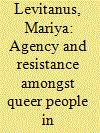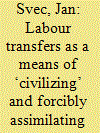| Srl | Item |
| 1 |
ID:
186633


|
|
|
|
|
| Summary/Abstract |
This article focuses on the everyday lives of queer people in Kazakhstan, exploring how they express agentic power and negotiate their queer identity. This research is based on a Foucauldian-informed narrative analysis of in-depth interviews with 11 people who identify as queer and live in Kazakhstan. Findings show that the choice and ability to regulate one’s visibility are crucial expressions of queer agency and resistance. This paper expands on previously published research on gender and sexuality in Central Asia by focusing beyond the issues of violation of human rights and the difficult experiences of queer people, by considering instances of acceptance, support and positive experiences alongside experiences of homophobia, transphobia and discrimination.
|
|
|
|
|
|
|
|
|
|
|
|
|
|
|
|
| 2 |
ID:
186628


|
|
|
|
|
| Summary/Abstract |
The article examines the small group of Dungan people in Osh, South Kyrgyzstan, who used their ethnic identity as a strategy to maximize their chances of survival by orienting themselves towards different available dominant groups (Uzbeks and Kyrgyz) at different points in time, in contrast to similar Dungan groups in other places. Unlike existing research that suggests that ethnic switching derives from an individual’s need, this study conceptualizes the notion of ethnicity as a collective choice through a conceptual framework combining the relational theory of ethnic identity based on a psychological approach and its key concepts such as accessibility, fit, variation and flexibility.
|
|
|
|
|
|
|
|
|
|
|
|
|
|
|
|
| 3 |
ID:
186631


|
|
|
|
|
| Summary/Abstract |
Uzbekistan’s first law targeting violence against women (2019) appears against the backdrop of decades of understudied resistance and struggle on the part of non-state actors, such as activists, survivors and volunteer organizers. This article draws on fieldwork, interviews and content analysis to offer examples of these continuing grassroots struggles. We situate, discuss and analyse three prevalent strategies of ‘exit’ and ‘voice’ – protest in the act of self-immolation, seeking out shelter and participation in consciousness-raising – that are variously employed by women in contemporary Uzbekistan to combat their experiences with domestic and gender violence. We frame these cases in the context of the past politicization(s) of women’s bodies and read them as portals to two examples of collective self-organizing in Samarkand, Uzbekistan – an old grassroots women’s shelter and a new digital counterpublic – calling attention to the complicated role played by privileged actors that shield such parallel and collectivized initiatives from encroachments by the state.
|
|
|
|
|
|
|
|
|
|
|
|
|
|
|
|
| 4 |
ID:
186632


|
|
|
|
|
| Summary/Abstract |
Despite the extensive literature on the nexus between civil society and democratization in non-democratic regimes, most existing scholarship focuses on politically oriented and claim-making civil society organizations. While these accounts provide useful insights, they appear to rely on Western-centric understandings of civil society. Undoubtedly, little space exists in non-democratic regimes within which civil society organizations may engage in overt political activism due to governmental restrictions. Notwithstanding these restrictions, there are politically less threatening social arenas, where it is possible to identify informally organized civil society initiatives with the potential to redefine and influence long-term state–society relations. This article argues that what we might think of as civil society initiatives in non-democratic regimes cannot be satisfactorily understood through the lens of Western-centric understandings of civil society. Instead, we should focus on informal civil society initiatives. These processes will be illustrated through the case study of mahalla institutions in Uzbekistan.
|
|
|
|
|
|
|
|
|
|
|
|
|
|
|
|
| 5 |
ID:
186629


|
|
|
|
|
| Summary/Abstract |
The mass influx of people from the former republics of the Soviet Union has resulted in ‘migration’ and ‘integration’ being one of the central foci of debate in contemporary Russia. This article examines the Ismaili Muslim migrants from Tajikistan in Moscow. It pays particular attention to the ways in which the community impacts migrants’ integration into a host society. Using a case study approach, the article presents the diversity in terms of viewpoints and approaches to socio-cultural integration. The data were gathered thorough participant observations and semi-structured interviews. The findings suggest that strong religious identity and the community closure based on religious affiliation can hinder the Ismaili migrants’ integration. The case studies show that an intention to settle permanently in Russia is one of the key factors determining migrants’ attitudes towards integration.
|
|
|
|
|
|
|
|
|
|
|
|
|
|
|
|
| 6 |
ID:
186627


|
|
|
|
|
| Summary/Abstract |
The article provides supporting evidence of organized labour transfers of Turkic minorities, primarily Uyghurs, from Xinjiang to other regions in China. From a theoretical point of view, the article places these transfers in the context of the efforts by China’s authorities to ‘civilize’ and forcibly assimilate ethnic minorities, reminiscent of ‘civilizing missions’ carried out by colonizing nations in the past. The article presents an analysis of official Chinese documents and media reports and a content analysis of almost 80 unofficial online posts ‘offering’ ethnic minority labourers. The analysis reveals that at least 60,000 labourers could be ‘offered’ for transfers outside Xinjiang in the course of 2020 alone, thus suggesting that the scope of transfers has significantly intensified.
|
|
|
|
|
|
|
|
|
|
|
|
|
|
|
|
| 7 |
ID:
186630


|
|
|
|
|
| Summary/Abstract |
Discussions about state capacity and special economic zones (SEZs) arise in disparate academic circles, despite the fact that they both often address the relative level of state intervention in economic activity. Can the economic limitations of low state capacity be mitigated by the benefits of an SEZ? Drawing from interviews with non-governmental organization workers, bureaucrats and traders in the Gorno-Badakhshan Autonomous Oblast (GBAO) region of Tajikistan, this paper presents the case of the Tajik–Afghan cross-border free-trade markets as an example of a popular SEZ in a region marked by enduring diminished administrative state capacity. Highlighting the use of the administrative capacity of non-state actors, and its periodically contentious intersection with state coercive capacity, this paper illustrates the novel creation of SEZs to facilitate economic growth in contexts of enduring low administrative state capacity.
|
|
|
|
|
|
|
|
|
|
|
|
|
|
|
|